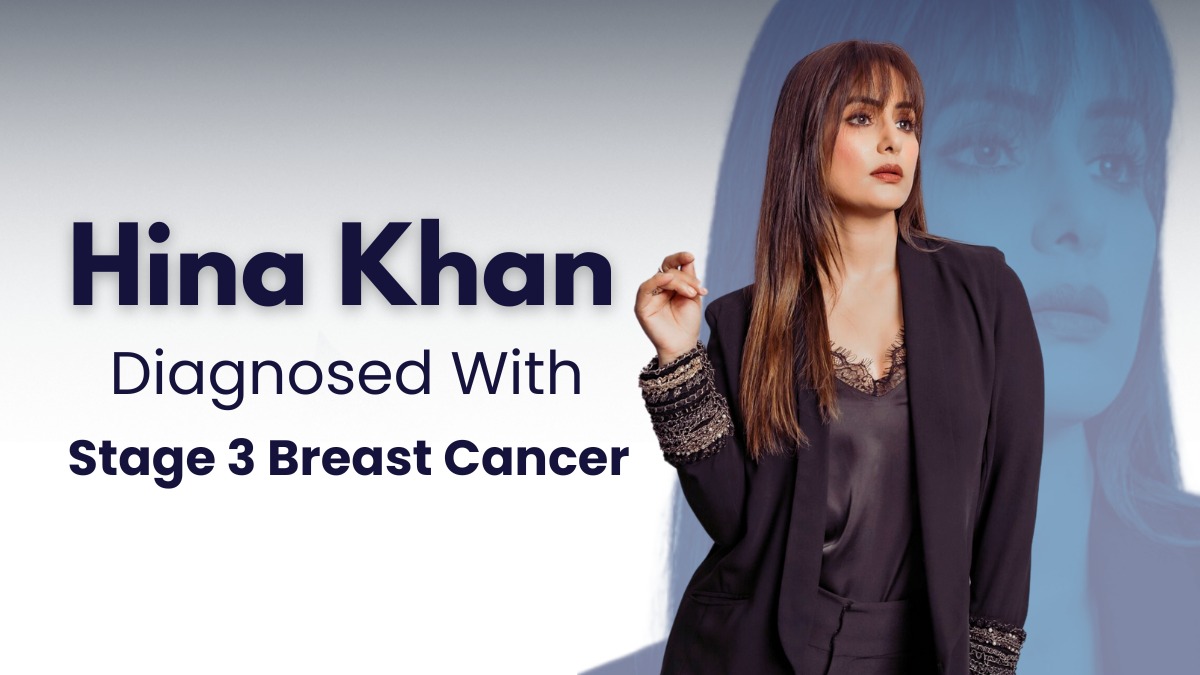
Actor Hina Khan took to Instagram to disclose that she is battling stage 3 breast cancer. She assured her fans that she has started her treatment and remains resolute in overcoming this challenge to emerge healthy and strong. She asked for privacy and assured her fans that with her family's support, she would overcome this challenge. We spoke to our expert Dr Pritam Kataria, Consultant, Medical Oncology, Sir HN Reliance Foundation Hospital and Research Centre, Mumbai, who explained breast cancer, importance of early detection, and the treament measures.
Table of Content:-
View this post on Instagram
"Carcinoma of the breast is the most common cancer worldwide and among females in India. The risk factors for breast cancer are diverse, encompassing both modifiable and non-modifiable elements," said Dr Kataria.
According to Cancer Research UK, Stage 3 indicates that the cancer has metastasised from the breast to nearby lymph nodes, the breast skin, or the chest wall. This stage is also known as locally advanced breast cancer and can be divided into 3A, 3B and 3C.
Breast Cancer Stages

There are four stages of breast cancer: stage 1, stage 2, stage 3, and stage 4.
- Early Stages (1-3): Breast cancer in stages 1, 2, and 3 can potentially be cured if detected early. The National Cancer Institute (NCI) reports that the 5-year relative survival rate for women diagnosed with stage 3 breast cancer is approximately 86%.
- Advanced Stage (4): Stage 4 breast cancer is generally considered incurable, emphasising the importance of early detection to improve cure rates and reduce treatment-related morbidity.
Also Read: Pregnancy And Breast Cancer: Expert Explains Treatment Strategy And Its Impact On The Baby
Importance of Early Detection
Early diagnosis of breast cancer significantly increases the chances of successful treatment. Catching the disease in its initial stages can lead to higher cure rates and less severe treatment consequences, said
"Early detection of breast cancer is crucial. Diagnosing the disease in its initial stages significantly increases the chances of a cure for a larger percentage of the population," said Dr Kataria. Its benefits include:
- Higher Cure Rates: Early diagnosis allows for more effective treatment, leading to higher survivability
- Reduced Morbidity: Catching the disease early can minimise the severity and side effects of the treatment
By identifying breast cancer at an early stage, patients can benefit from improved outcomes and less invasive treatment options.
Also Read: From Physical To Emotional Impact: Expert Lists Complications Of Breast Cancer You Should Know
Treatment Options for Breast Cancer

"Treatment strategies for breast cancer vary depending on the stage and receptor status (ER, PR, and HER2) of the cancer," said Dr Kataria.
General Treatment Approaches
- Surgery: May be performed with or without radiation, chemotherapy, or hormone therapy
- Radiation Therapy: Often used in combination with other treatments
- Chemotherapy: Administered depending on the stage and characteristics of the cancer
- Hormone Therapy: Applied based on the hormone receptor status of the cancer
Treatment Approaches for Stage 3 Breast Cancer
"In cases of stage 3 breast cancer, the treatment approach typically begins with chemotherapy for the majority of patients. This decision involves a multidisciplinary approach, requiring input from surgeons, oncologists, and radiation oncologists," said Dr Kataria. Based on the evaluation, the medical team determines whether chemotherapy should precede surgery. Also, the consideration of adding targeted therapy alongside chemotherapy is essential.
Following surgery in some stage 3 breast cancer patients, chemotherapy and radiation therapy may follow as initial treatments. The decision to administer hormone therapy depends on the hormone receptor status of the patient.
Dr Kataria added, "Treatment protocols for stage 3 breast cancer commonly include chemotherapy with or without targeted therapy, followed by surgery and potentially hormone therapy tailored to the receptor status."
According to the American Cancer Society, stage 3 breast cancer usually necessitates more extensive treatment compared to earlier stages. However, the specific approach depends on several factors, such as
- Hormone receptivity
- Cancer grade
- Cancer type
- The individual's overall health and personal preferences
- Menstrual status
[Disclaimer: This article contains information provided by an expert and is for informational purposes only. Hence, we advise you to consult your own professional if you are dealing with any health issues to avoid complications.]
Also watch this video
How we keep this article up to date:
We work with experts and keep a close eye on the latest in health and wellness. Whenever there is a new research or helpful information, we update our articles with accurate and useful advice.
Current Version